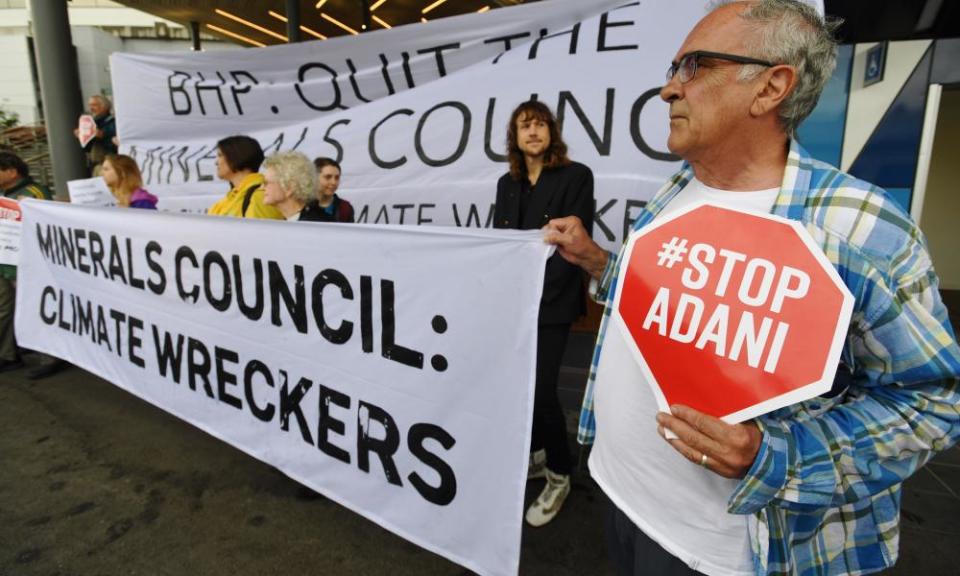BHP will not quit Minerals Council despite differing views on climate change and pricing emissions

BHP has bucked shareholder pressure to quit the Minerals Council of Australia and will remain a member of the lobby group despite disagreeing with it over the importance of putting a price on carbon emissions.
After a review of its membership of industry associations, first revealed by Guardian Australia, BHP has decided not to leave any of them.
The move comes despite almost 30% of shareholders last month voting in favour of a resolution that would have forced BHP to quit the Minerals Council and other industry bodies that hold positions on global heating at odds with the company’s.
Related: BHP pressured to quit Minerals Council after shareholder vote
Australia’s biggest super fund, AustralianSuper, has also attacked the Minerals Council’s position as “not strong enough”.
“We will continue to work with the MCA to ensure that, where it is undertaking advocacy, this remains consistent with its stated policy,” BHP said in its review of industry organisations, released on Thursday.
However, BHP said it will again review its membership of the NSW Minerals Council before 30 April because of its recent attacks on zero emissions targets.
It said the NSW body’s formal position on resolving the “energy trilemma” of delivering cheap and reliable power while reducing emissions was acceptable.
“In recent times, however, the NSWMC has used language and arguments that suggest the association believes emissions reduction should be deprioritised relative to, or is incompatible with, affordability and reliability,” BHP said.
BHP said it will also remain a member of Coal21 after the group agreed to limit its activities to research into low-emission coal technology.
In August, Coal21 planned an $4.5m ad blitz to “invoke national pride” in coal, but BHP said that the following month it supported a change to the organisation’s constitution curbing such activities.
It said it had resolved most of its differences with the US Chamber of Commerce after the body issued a new statement supporting the Paris agreement to keep global heating below 2C.
However, it still had “material differences” on policy with the chamber and three other bodies: the American Petroleum Institute, the Mining Association of Canada, and the NSW Minerals Council.
At BHP’s annual general meeting in November, the activist investor group Australasian Centre for Corporate Responsibility (ACCR) called on BHP to quit industry bodies that have a long-term track record at odds with the company’s support of emissions reduction.
Dan Gocher, the ACCR’s director of climate and environment, said the company’s report was “a vindication of BHP shareholders’ concerns in the worst way possible”.
“BHP has asked shareholders to hold fire until the end of the year, and then released an impotent review in which the company refuses to bring any of its industry groups to heel,” he said.
“The investors who backed BHP’s board now look foolish and weak, in the midst of a catastrophic climate-related bushfire crisis in Australia.
“This only amplifies our concerns about incoming CEO Mike Henry’s proximity to the worst of the fossil fuels lobby in Australia.”

 Yahoo Finance
Yahoo Finance 